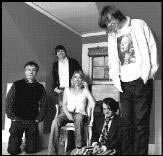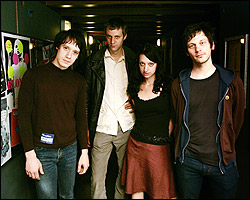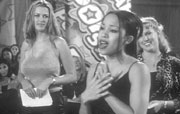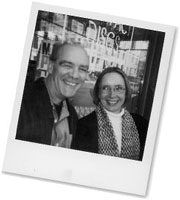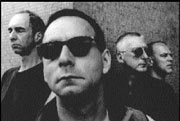SONIC YOUTH
Bumbershoot, Memorial Stadium, $20
4:45 p.m. Sun., Sept. 1
Lee Ranaldo has had a long time to get used to the somewhat paradoxical idea of being an indie-rock star. His band, Sonic Youth, has been together for over 20 years and has released some 24 albums.
Despite their continued critical and commercial success, on tour Sonic Youth tend to stay at Comfort Inns, rather than Ritz-Carltons. I recently spoke to Ranaldo from an Econo Lodge somewhere in Denver about the band, favorite books, and his advice for up-and-comers.
Seattle Weekly: Yours is the level of success that most indie bands aspire to. When asked where they’d like to see their band go, most cite Sonic Youth’s career and say they’re aiming for something like that. Do fans and younger bands often ask you for advice on how to get there?
Lee Ranaldo: It comes up a lot. Our situation is just one that’s been incredibly lucky. The one thing we’ve always been clear on amongst ourselves is that we were interested in, on the one hand, being artists, and on the other, making music that we found interesting. It was about doing what we felt was true and letting things fall into place after that. Still, to this day, we do it because we find there’s something really special that happens when we play together.
The answer we give [is that] you’ve got to stay focused on wanting to do it. You sort of remain a student on a certain hand. We’re constantly researching things, whether it be reading biographies or discovering new music and listening to new music or whatever. It’s a constant part of your life, this enthusiasm for not only what you’re doing but for what other people are doing and through that, tapping into this long historical progression in the field of creativity. It’s a way of tapping into this much bigger picture of humanity. It’s an ongoing education.
What kind of stuff are you guys reading these days?
We’ve been passing around Fast Food Nation, that expos頯f the whole fast food corporate structure. Books about eating well have been going around. There’s some Captain Beefheart bio going around. There’s a recently released Grateful Dead biography called A Long Strange Trip by this guy, Dennis McNally—I know Thurston [Moore] just bought that and it’s gonna get passed around. The Neil Young biography, Shakey, has been the big one this summer. It’s a really well-done bio.
You and Thurston have both published books—tell me about that.
In ’95, we did that Lollapalooza tour and a bunch of us were keeping tour journals online. I was involved in instigating and editing this book that came out called Online Diaries [Skull Press]. It was me and Thurston and Beck and Steve Malkmus and David Yow from Jesus Lizard and Courtney [Love] and Mike Watt. It’s very common now for you to be able to find tons of personal writing by people online but, at the time, it was very new. I was encouraging everyone to keep a journal during that tour, because we did have this access, this fairly new online thing.
There’s a long history of that kind of stuff being published, and I’ve always been really fascinated with reading it; whether it’s Anais Nin’s journals from the ’20s and ’30s in Paris, or Jack Kerouac or Allen Ginsberg. I’ve always been interested in that as a window into people’s lives, and if there’s a particular person you’re really interested in, reading their journals is a great way to get a personalized view of their life.
I’ve always kept journals since I was very young. I’m constantly reading biographical stuff about musicians too, whether it’s Hank Williams or Coltrane or John Lennon or whoever. I find that stuff really interesting.
Do you ever find that being such an avid reader—especially of music history and biographies—is a bad thing, that it makes you overly conscious about what you’re doing?
Sometimes you have to put that stuff away and just dig into your own life and not get too absorbed in what someone else is doing. Not to be too conscious of writing your own biography and just concentrate on living it.
And that goes back to the advice you give when people ask you about success.
Yeah, we just kind of start working and really focus on the music. I think, thankfully, that’s probably the healthiest way to be. If you start [overthinking] when you’re creating, it’s just bound to be a disastrous thing. That just leads to bad art.
